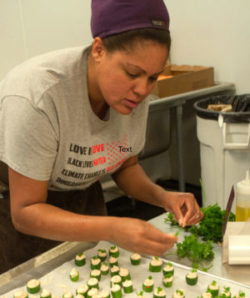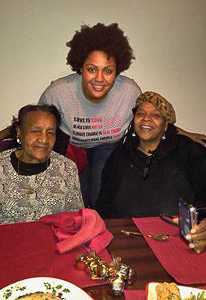The fellowship of food is an integral element of Black culture.

My earliest memories are in the kitchen, cooking with my mother and both my grandmothers. For these women, the kitchen has always been the center of their home. Around the age of four is when I first started helping my mother cook – simple tasks at first, such as sprinkling salt and pepper on sunny side eggs as they cooked or helping to sift flour into a mixing bowl. I have memories of sitting on the counter while my maternal grandmother helped me measure out milk for pudding. By around the age of five, I knew that it was in my blood to become a chef. Black people, Black women in particular, have a long standing history of feeding this country. The only thing that truly makes my story unusual is that I became a professional chef and it was my chosen career, not one pursue out of necessity.
It is the struggles of Black people in America that eventually gave birth to the now sought-after cuisine known as Soul Food. While many of us do it today out of love and tradition today, communal cooking and eating – or commensality – was a necessity from the time of slavery on through Jim Crow.
During the days of slavery, Blacks were fed as cheaply as possible and typically with discarded parts of animals and vegetables. Some slaves were able to supplement their insufficient ratio

Other staples in the Black slave’s diet were brought over directly during the Atlantic slave trade. Foods such as okra and rice were staples in West African cuisine. While fried chicken is traditionally Scottish, the Scots fried it without seasoning or batter; it was West African slaves who applied their flavor profile and cooking techniques to make it the dish we now know and love today. Fried chicken would later play an integral part in Black culture as it became popular with slaves during the Civil War and during the Jim Crow era – when Blacks were not allowed to dine in restaurants when going into town for work and needed to be able to pack nourishment that would keep and travel well.
These necessities, all practiced for so long, eventually became ingrained in Black culture. With the Emancipation Proclamation and the Exodusters, freed Black slaves migrated from the South, taking Soul Food with them (although the term wouldn’t be coined until around the 1960’s, gaining popularity with Malcolm X’s use of the term to express how food has the power to unite and how Soul Food ties us back to our ancestors no matter where we are). The necessity for commensality has now become a pleasure for the Black community and now soul food, and the commensality that comes along with it, is enjoyed and sought after by people of all colors.

So what does Black History Month mean to me as a chef, in particular as a Black chef from the South? As a Black chef, Black History Month is a time when I reflect on what we were given and what we made. My ancestors created a beautiful and iconic cuisine from their struggles. I can actually taste what my people fought and died for. My ancestors spun straw into gold. The cuisine of slaves, the cuisine of my ancestors, is the cuisine of American history.
In honor of Black History Month, and of my mother grandmothers, who passed down the love of commensality from my ancestors, I have put together a few items we are featuring at Farm to Feast Catering for the month of February. All of these dishes have a rich history and represent how necessity gave birth to pleasure.
Buttermilk Fried Chicken
Pot Liquor Soup with Corn Bread Bites (vegetarian)
Hoppin John
Stewed Okra and Tomatoes (vegan)
Southern Style Potato Salad (vegetarian)
See this special menu here.
